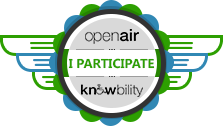Of all the therapies that I have had, I believe that vision therapy has helped me the most.
I wanted to write about vision therapy today because the NeurOptometric Research Association (NORA) is holding their annual meeting this week in Cary, North Carolina.
I wish I could be there.
Many of the speakers at the meeting will be discussing how vision therapy can help with recovery from persistent symptoms following mild traumatic brain injury/concussion.
Here’s the program:
http://nora.cc/images/stories/nora-conference-brochure-2014.pdf
A friend of mine, Cavin Balaster, is keynoting at the conference. I am so excited for him. He will be talking about how vision therapy has helped him with his recovery from a severe brain injury.
I first met Cavin about two years ago at a Brain Injury Association of Texas conference where I was speaking. Like I said, Cavin had a severe injury after falling from a tower in Brooklyn, New York. His recovery started with coming out of a coma. His early recovery was at Mt Sinai Hospital in New York City.
I met Cavin after he was released from the hospital and inpatient rehabilitation. He and his mom had returned to Austin to begin the next phase of recovery.
Like me, Cavin was doing vision therapy which he started in NYC. By the time I met him, he was working with Dr Denise Smith OD here in Austin who I had begun working with also. Cavin and I bonded quickly as there are not many people who have been fortunate enough to know about vision therapy and who have experienced the improvements that come from it.
We also noticed, while eating lunch together with his mom, Kim, that we both were choosing what we ate quite carefully. We both wanted to eat to support our brain injury recovery as best we could.
A month ago, I invited Cavin to join me to watch the Dewey Winburne awards at SXSW-Interactive. The Dewey Winburne awards are awarded to entrepreneurs and technologist who increase accessibility worldwide. The Dewey Winburne awards are very special part of SXSW for me. My former mentor, Dr John Slatin, at the then-Institute of Technology and Learning at the University of Texas (now the Accessibility Institute) was very involved in the accessibility community here in Austin. Dr Slatin had learned to overcome loosing his eyesight later in life, and he taught me a lot about compensation strategies in his life. He also helped me launch my speaking career. He motivated me to write about how I was improving after brain injury and my efforts to find rehabilitation and get back to work. He told me that there was little information about how to return to work in the blind community and that he imagined there was even less literature about doing it in the brain injury community. John also got me involved in contributing to making website accessibile for people with cognitive disabilities.
Here is info about the 2014 Dewey Winburne awards:
http://sxsw.com/interactive/awards/dewey
I invited Cavin to watch the awards as he is the first person that I know who has done a successful Kickstarter campaign to support his book about his recovery. Many in the vision therapy community reached out to support his endeavor because of his enthusiasm and improvement and his passionate desire to help others.
I will talk about teh benefits of my vision therapy in a later post!

